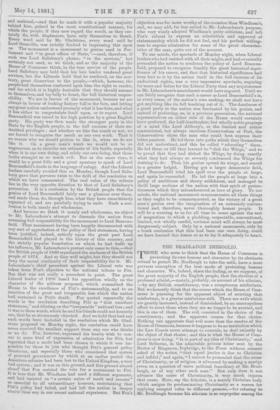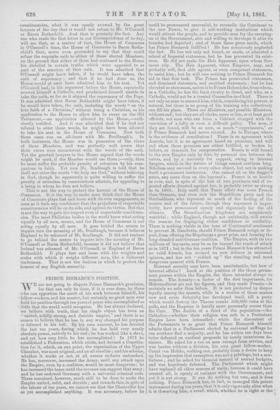THE BRADLAUGH IMBROGLIO.
THOSE who seem to think that the House of Commons is protecting its own honour and character by its obstinate refusal to permit Mr. Bradlaugh to take the oath, have a most perverse conception of the best mode of protecting honour and character. We, indeed, share the feeling, as we suppose, of the great majority of the English people, that the election of a professed atheist,—mainly, probably, on account of his atheism, —by any British constituency, was a conspicuous misfortune. But we honestly think that the course which the House of Com- mons is pursuing for the apparent object of averting that misfortune, is a greater misfortune still. There are evils which are greatly increased, instead of diminished, by an unscrupulous effort to avert them when they are no longer to be averted, and this is one of them. The evil, consisted in the choice of the constituency, and the apparent reason for that choice. Nothing can aggravate that evil more than the resolve of the House of Commons, because it happens to be an institution which the Law Courts never attempt to overrule, to deal unjustly by the, object of that choice ; and this is what the House of Com- mons is now doing. "It is part of my idea of Christianity," said Lord Selborne, in the admirable private letter sent by the Rector of Ringmore, Ivybridge, to the Times without consent asked of the writer, "that equal justice is due to Christian and infidel ;" and again, " I cannot be persuaded that the cause of Christianity, or of religion, is advanced by making a martyr (even on a question of mere political franchise) of Mr. Brad- laugh, or of any other such man." Not only does it not advance the cause of Christianity, it very much injures that cause. Here, say the Atheists, is a mainly Christian body which assigns its predominating Christianity as a reason for applying unequal rules to different persons,—for refusing to 'Mr. Bradlaugh because his atheism is so unpopular among the
constituencies, what it was openly avowed by the great lawyers of the day that it would not refuse to Mr. O'Connell or Baron Rothschild. And that is precisely the fact. Any one who reads the first letter in our Correspondence of to-day, will see that, as a matter of fact, the House of Commons in O'Connell's time, the House of Commons in Baron Roths- child's time, never even pretended to say that they could refuse the requisite oath to either of these elected Members, on the ground that either of them had confessed to the House his disbelief in certain truths which were appealed to as part of the sanction of that oath. It was admitted that 'O'Connell might have taken, if he would have taken, the • oath of supremacy ; and that if he had done so, the House would at once have admitted him to his seat. Yet O'Connell had', in his argument before the House, repeatedly avowed himself a Catholic, and proclaimed himself unable to take the oath, so far as it abjured the supremacy of the Pope. It was admitted that Baron Rothschild might have taken, if he would have taken, the oath, including the words " on the true faith of a Christian," without being a Christian, as his application to the House to allow him to swear on the Old Testament,—an application allowed by the House,—suffi- ciently testified. And it was admitted that if he had not refused to utter those words, he might have been allowed to take his seat in the House of Commons. Now both these cases run on all-fours with Mr. Bradlaugh's. In both instances, the House was in possession of the views of these Members, and was perfectly well aware that their views were inconsistent with the words of the oath. Yet the greatest lawyers in the House argued that the words might be used, if the Member would use them ;—only, then • he must suffer the probable penalty of ostracism by his com- panions in faith. Yet now Mr. Bradlaugh is told that he shall not utter the words " So help me God," without believing in God, though ho apparently is quite willing to suffer the penalty of ostracism by conscientious atheists, for appealing to a being in whom he does not believe.
This is not the way to protect the honour of the House of Commons. It is the way to make men think that the House of Commons plays feat and loose with its own engagements, so soon as it feels any confidence that the prejudices of respectable constituencies will be on its side, and against its victim. But that is not the way to gain the respect even of respectable constituen- cies. The most Philistine bodies in the world know what acting equally by all men, means, and the House of Commons is not acting equally by all men. It goes behind the scenes to inquire into the meaning of Mr. Bradlaugh, because it believes England to bo ashamed of Mr. Bradlaugh. It did not venture to go behind the scenes to inquire into the meaning of Mr. O'Connell or Baron Rothschild, because it did not believe that Ireland was ashamed of Mr. O'Connell, or England of Baron Rothschild. It plays fast and loose with the weights and scales with which it weighs different men, like a dishonest tradesman. That is not the fashion in which to protect the honour of any English assembly.







































 Previous page
Previous page